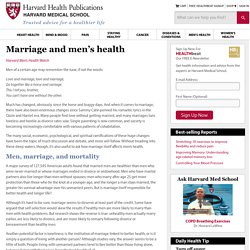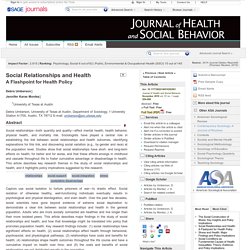

Is Marriage Good for Your Health? 10 Health Benefits of Being in a Relationship. Relationship Health Benefits: 10 Reasons Why It's Good For You To Have A Significant Other. Valentine's Day is upon us, and what better time to reflect on the many benefits of being in love?

Of course the emotional benefits are no secret, but there is a vast wealth of research showing the physical and mental benefits of coupledom. Here, 10 healthy reasons to celebrate love, marriage, relationships and everything in between: 1. Married people are less likely to have a heart attack. Sure: eating well, exercising and not smoking are all the best ways to protect yourself from having a heart attack. The study analyzed heart attack rates (both fatal and nonfatal) among married and unmarried people living in Finland, and showed that married men and women were less likely to have, or die from, a heart attack, compared with their single peers. 2. 3. 4. 5. "People, on average, aren’t happier following marriage than they were before marriage, but they are happier than they would have been if they stayed single," study researcher Stevie C.
Marriage and men's health. Men of a certain age may remember the tune, if not the words: Love and marriage, love and marriage,Go together like a horse and carriage.This I tell you, brother,You can’t have one without the other.

Much has changed, obviously, since the horse and buggy days. And when it comes to marriage, there have also been enormous changes since Sammy Cahn penned his romantic lyrics in the Ozzie and Harriet era. Many people find love without getting married, and many marriages turn loveless and hostile as divorce rates soar. Single parenting is now common, and society is becoming increasingly comfortable with various patterns of cohabitation. Social Relationships and Health. A Flashpoint for Health Policy Abstract.

The Effects of Marriage on Health: Prepared for:U.S.

Department of Health and Human Services (HHS)Office of the Assistant Secretary for Planning and Evaluation (ASPE)Office of Human Services Policy (HSP) Contract Number 233-02-0086, T.O. 9 By: Robert G. Social Relationships and Health: A Flashpoint for Health Policy. The best medicine report 2015. Good relationships have direct health benefits: study. Relationships have health benefits that can help people live longer, a team of researchers says.

Whether it's working out with a gym buddy, cooking a healthy meal for family or going to see a doctor on the advice of a spouse, "relationships provide a sense of meaning and purpose in our lives - they can lead us to take better care of ourselves," said Julianne Holt-Lunstad, an associate psychology professor at Brigham Young University in Provo, Utah. Prof. Holt-Lunstad co-wrote a report that said that people with strong relationships are 50 per cent more likely to live longer than those with few social links with family, friends, neighbours or colleagues.
Or to put it another way, the researchers say their study shows that isolation carries the same risk of early death as smoking 15 cigarettes a day, not exercising, or being an alcoholic or severely obese. "Our relationships can have direct health benefits," said Prof. Prof. Since losing his wife Sudesh to cancer 19 years ago, Mr. Prof. Health benefits of falling and staying in love. Love may make the world go 'round, but is it powerful enough to lower one's blood pressure, reduce depression and speed the healing of an injury?

With Valentine's Day just around the corner, we set out to find the answer and discovered that science says yes. "Our relationships help us cope with stress, so if we have someone we can turn to for emotional support or advice, that can buffer the negative effects of stress," says Julianne Holt-Lunstad, an associate professor of psychology at Brigham Young University, who has been publishing studies for the past 10 years on social relationships and their influence on health and disease.
The health benefits of strong relationships. Good connections can improve health and increase longevity.

For many of us, the holidays mean family gatherings, getting together with friends, and participating in special religious, community, and workplace activities. Such occasions are an opportunity to check in with each other, exchange ideas, and perhaps lend a supportive ear or shoulder. Social connections like these not only give us pleasure, they also influence our long-term health in ways every bit as powerful as adequate sleep, a good diet, and not smoking. 2010 PR Braithwaite. AmerPsycholpaper. Family Matters - Issue 96 - Marriage, cohabitation and mental health. The Benefits of Marriage. Marriage is linked to health and economic benefits.

Married individuals tend to have better physicalhealth, psychological well-being, and a lower mortality risk. Financially, married men tend to earnmore, and married women are less likely to fall into poverty. Marriage is also linked to greater wealthaccumulation. Married couples report greater sexual satisfaction. The highest levels of sexual satisfaction were reported by individuals who were in married, monogamous relationships, while those who were single or cohabiting reported slightly lower levels of sexual satisfaction.1Married women report higher levels of physical and psychological health. Social Relationships and Health: A Flashpoint for Health Policy.